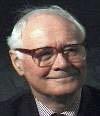Why is the Universe so Special?A second reason for that belief can be found in the answer to my second metaquestion, Why is the universe so special? Of course, here I am referring to the findings of the Anthropic Principle. Other contributors to this volume have already outlined the many considerations that lead us to conclude that the laws of nature as we observe them in our universe are precisely those that permit the development of carbon-based life, in the sense that even very small changes in intrinsic force strengths would have broken links in the long, delicate and beautiful chain of consequences linking the early universe to the existence of life today here on Earth. I agree with John Leslie`s analysis, presented in his book Universes, that suggests, firstly that it would be irrational just to shrug this off as a happy accident, and secondly that there are two broad categories of possible explanation: either many universes with a vast variety of different natural laws instantiated in them, of which ours is the one that by chance has allowed us to appear within its history; or a single universe that is the way it is because it is not “any old world”, but a creation that has been endowed by its Creator with just the circumstances that will allow it to have a fruitful history. I simply want to make two comments on this analysis. The first is to emphasize that both proposals are metaphysical in character. That is clear enough in the case of creation, but it is also true of a many universes proposal that is wide enough in scope actually to serve as an explanation. Of course, an inflation-expanded structure, containing many domains with differing consequences of spontaneous symmetry breaking, could give vast regions in which effective force constants differed and in one of which they might take the anthropically desirable values, but that would still require that the overall Grand Unified Theory was constrained in its character in order to permit this to happen. Something specific and requiring explanation would remain. I regard quantum cosmology and baby universes as being too precarious and speculative in character at present to rely on. In any case, the underlying theory would again have to take an appropriate form. One might comment that quantum theory, general relativity and suitable matter fields do not “come for free”, so to speak. It is important to recognize that that anthropic fruitfulness requires the right kinds of laws as well as the right values for the parameters appearing in those laws. It is very difficult to see what could ensure this right character of fundamental physical law, realizing the necessary combination of flexibility and stability required to make fruitful evolution possible, other than a strictly metaphysical proposal. The second point is to agree with Leslie that, in relation to the Anthropic Principle, it is a metaphysically even-handed choice between many universes and creation. It seems to be six of one and half a dozen of the other, neatly illustrating the point I made that these kinds of argument are not knockdown in their character. However, I believe that, while the many universes hypothesis seems to have only one explanatory piece of work that it can do, there are other kinds of explanation that the thesis of theism can afford, such as granting an understanding of the intelligibility of the universe, and also providing the ground for the widely-attested phenomena of religious experience. (Of course, the history of religions is a tangled tale. Weinberg is right to draw our attention to the sad fact that religion can cause good people to do bad things, but we should also recognize that religious conversion has often led to bad people becoming able to do good things.) My conclusion is to prefer the explanation of anthropic fruitfulness in terms of a Creator, which strikes me as being more economic and forming part of a cumulative case for theism.
Contributed by: Sir John Polkinghorne |





